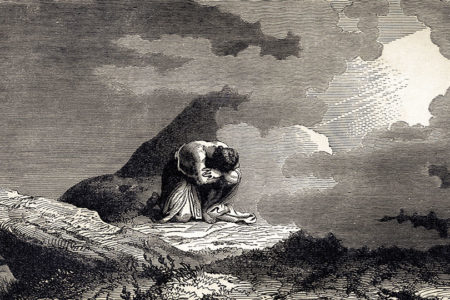Joshua’s Farewell
The Bible is replete with commandments to live by. The most-often repeated ones are to love the Lord and obey His Word. Obedience produces blessing. Disobedience produces judgment. Joshua understood these principles well and, at the end of his life, restated them for Israel and admonished the nation to serve the Lord.
At 110 years old (Josh. 24:29), Joshua still remembered when he had marched through the Red Sea with Moses. He had seen water flow from a rock, manna fall from heaven, and the sun stand still. He had witnessed all the many wonders Almighty God had done for His people, and he knew it was vital this new generation of Israelites not forget them. So when he was old, he summoned the people to bid them farewell and encourage them before he died.
Israel’s Obligation
And ye have seen all that the LORD your God hath done unto all these nations because of you; for the LORD your God is he who hath fought for you (Josh. 23:3).
Joshua began by reminding the Israelites of the victories they had won because of the Lord, and he encouraged them to trust the Lord and move forward in faith to possess all the land God gave them: “The LORD your God, he shall expel them [the remaining nations] from before you, and drive them from out of your sight; and ye shall possess their land” (v. 5).
But there was one major condition. They were to remain absolutely loyal to Jehovah alone. The children of Israel were to “keep” and “do all that is written in the book of the law of Moses” and “turn not aside therefrom to the right hand or to the left” (v. 6). The Lord promised victory, possession of the land, safety in it, and His abiding presence if they obeyed His Word. In fact, God has always required His people, including Christians today, to obey His Scriptures and walk in His ways.
So Joshua instructed Israel, “Cleave unto the LORD your God” and “love the LORD your God” (Josh. 23:8; 11). The Israelites were to serve no other gods (Ex. 20:3) and be entirely devoted to Jehovah, who loved them and redeemed them.
Many people today believe God no longer loves the Jewish people because they failed to obey the law. But the Lord did not decide to love them based on their merit; He loves them because He loves them (Dt. 7:7–8). And Scripture teaches that God is not fickle, like men. The Lord does not change (Mal. 3:6); “Jesus Christ, the same yesterday, and today, and forever” (Heb. 13:8).
The eternal God of Abraham, Isaac, and Jacob is immutable. And His love for Israel is as loyal and steadfast today as it was thousands of years ago. But God’s love in no way abrogates His discipline.
Joshua’s Warning
As Moses had done with the previous generation, Joshua warned the Israelites to stay away from the Canaanites. They were not to marry them, worship or assimilate with them, or cling to them in any way. If they disobeyed, “know for a certainty,” said Joshua, “that the LORD your God will no more drive out any of those nations from before you; but they shall be snares and traps unto you, and scourges in your sides, and thorns in your eyes, until ye perish from off this good land which the LORD your God hath given you” (Josh. 23:13).
Since the beginning of time, “whom the Lord loveth he chasteneth” (Heb. 12:6). One of the most difficult realities to understand from Israel’s history is the Israelites’ recurring disobedience and turning from the one true God to false gods in the face of all the Lord had done for them. Had Israel been faithful to Him, it would have been the chief of nations; and all of human history would have been different. Instead, Israel was chastened.
Moses tried to warn the nation in Deuteronomy 28—29:
If thou shalt hearken diligently unto the voice of the LORD thy God, to observe and to do all his commandments which I command thee this day, that the LORD thy God will set thee on high above all nations of the earth (Dt. 28:1).
Yet from Deuteronomy 28:15 through 29:29, the Lord enumerates the terrible tragedies that will overcome His beloved people if they “wilt not hearken unto the voice of the LORD thy God” (28:15). God did not want to chasten Israel, but He had no choice.
Later, in Ezekiel 36, He says He ultimately drove them from their land in punishment because He “had pity [concern] for mine holy name, which the house of Israel had profaned among the nations [Gentiles], to which they went” (Ezek. 36:21). Yet He never fails to say that He will bring them back (Ezek. 37:21–22).
Clean House and Choose
Before he died, Joshua reminded the Israelites that God deserved their complete loyalty and devotion because He was faithful to them. What God had promised, He delivered:
Not one thing hath failed of all the good things which the LORD your God spoke concerning you; all are come to pass unto you, and not one thing hath failed thereof (23:14).
So he summoned the twelve tribes of Israel to Shechem “and called for the elders of Israel, and for their heads, and for their judges, and for their officers; and they presented themselves before God” (Josh. 24:1).
Joshua recounted Israel’s beginnings, all God had done for the nation, and gave it a “choice” that was really no choice at all:
Now, therefore, fear the LORD, and serve him in sincerity and in truth; and put away the gods which your fathers served on the other side of the river [Euphrates], and in Egypt, and serve ye the LORD. And if it seem evil unto you to serve the LORD, choose you this day whom ye will serve, whether the gods which your fathers served that were on the other side of the river, or the gods of the Amorites, in whose land ye dwell; but as for me and my house, we will serve the LORD (vv. 14–15).
They could either serve the false gods that could not deliver their enemies or they could serve the Lord, who was all powerful and had delivered them. Unfortunately, most people today still serve idols. Some worship manmade objects; others devote themselves to the objects of materialism and financial security. But God said, “Be not conformed to this world” (Rom. 12:2). The world desires to stamp its image on everything it owns. Yet God’s people do not belong to the world. They are to be imprinted with the image of the Lord. Like Moses, Joshua warned the Israelites of the consequences of following the world. Just as God would keep His promises to do them good if they were faithful, so would He keep His promise to punish them if they were not.
So the Jewish people made a covenant with their leader that day, “and set them a statute and an ordinance in Shechem. And Joshua wrote these words in the book of the law of God, and took a great stone, and set it up there under an oak that was by the sanctuary of the LORD” as a reminder (vv. 25–26).
Thus, after a lifetime of service to the Lord, Joshua the son of Nun died. He was buried “in the border of his inheritance in Timnathserah, which is in Mount Ephraim, on the north side of the hill of Gaash. And Israel served the LORD all the days of Joshua, and all the days of the elders who outlived Joshua, and who had known all the works of the LORD, that he had done for Israel” (vv. 30–31).








I have been blessed by this wonderful message. I would like to connect with you so that you become a blessing to the communities of faith in Tanzania. We need training desperately and sound biblical teaching for the growth of the church.
I am a pastor serving with Africa Inland Church Tanzania, a predominant Evangelical Church in North-western Tanzania. “Come over and help us.”